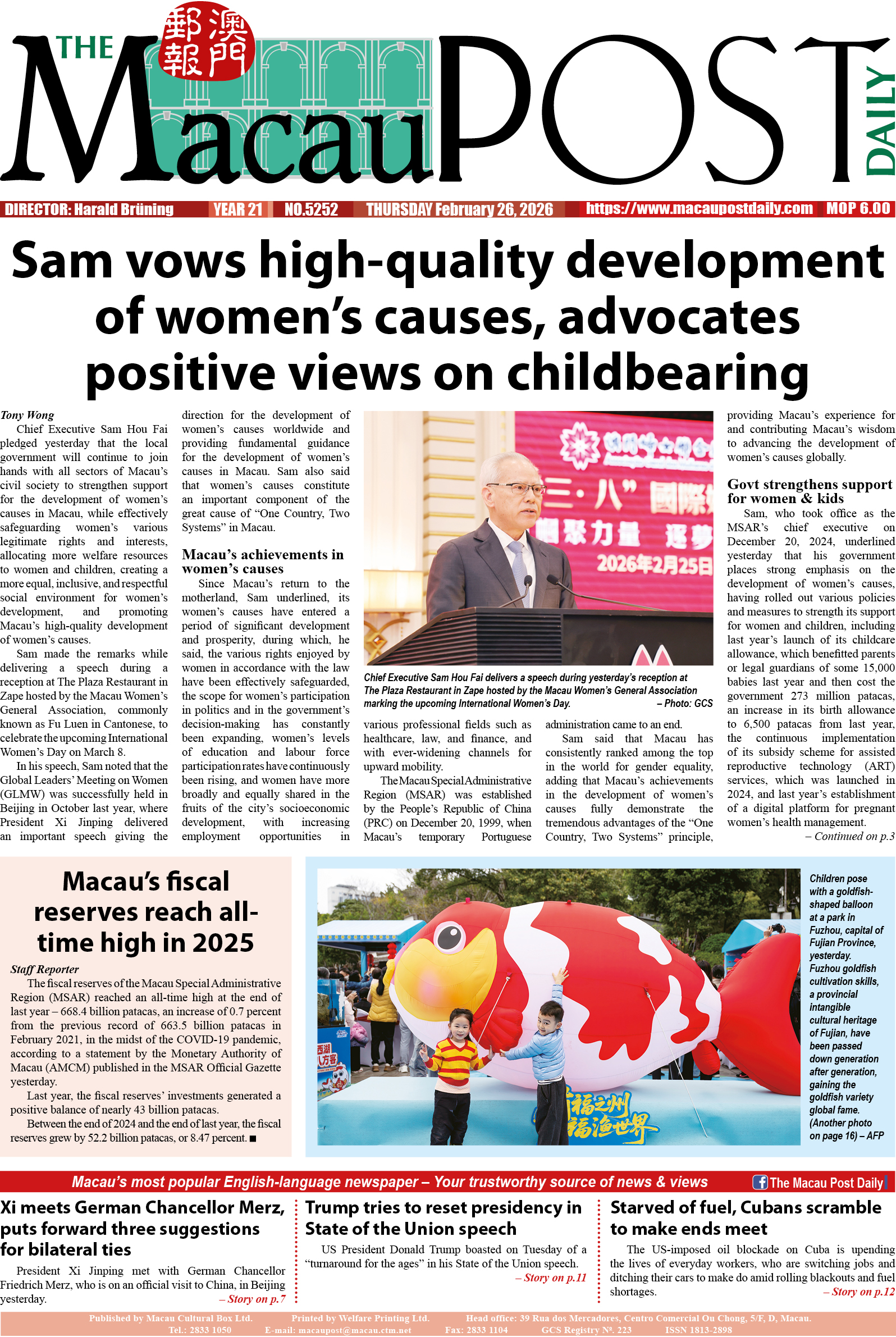Editorial
There has recently been quite a bit of talk about foreigners leaving Macau for a range of – perceived – reasons such as the government’s strict COVID-19 prevention and control measures, its “harsh” quarantine rules in particular, political developments locally, nationally and overseas, the economic downturn, growing unemployment and – wait for it – that Macau is becoming “too Chinese”.
Well, according to the government’s 2021 Census, Chinese nationals accounted for a whopping 89.2 percent of Macau’s population – aside from the most basic fact that Macau is IN China.
Nearly 22 years after Macau’s reversion to Chinese rule some people here still cling to the delusion that China “begins” only north of the Barrier Gate checkpoint. In fact, China’s national border lies way south of Macau in the South China Sea.
According to last year’s census, 64,700 foreigners lived in Macau at that time, or 9.5 percent of the population. Filipinos accounted for 5.0 percent of the population. According to the census’s ethnicity segment, 5,162 Portuguese lived in Macau in 2021.
Foreigners accounted for 29 percent of Macau’s 154,032 non-resident workers (NRWs) in August this year, including 24,739 Filipinos, 8,022 Vietnamese, 4,381 Indonesians, 2,864 Nepali and 2,136 Burmese. Some 71 percent of the NRWs were compatriots from the Chinese mainland, Hong Kong and Taiwan, according to data from the Labour Affairs Bureau (DSAL).
Macau’s population – comprising residents and NRWs – has fallen 2.7 percent since the novel coronavirus pandemic began to affect the local economy in early 2020 – from 696,100 in the first quarter of that year to 677,300 in the second quarter of this year, according to the latest available figures from the Statistics and Census Bureau (DSEC).
Incidentally, as someone who has been keenly interested in statistics since my university years back in the early 1970s, I would like to use this opportunity to praise the bureau’s top-notch work.
On the other hand, Macau’s population has risen 54.8 percent since the end of 1999, when the Macau Special Administrative Region (MSAR) was set up, with a population of 437,455. During the same period, Macau’s land area grew 38.6 percent, from 23.8 sq. km in 1999 to 33.0 sq. km in June this year.
As a matter of scale, local statistics’ large percentage changes within short periods of time can appear to be more dramatic than they actually are, such as in demographics, econometrics, and even geography.
There are two kinds of foreigners in Macau, those who have been granted non-permanent or permanent resident status and include the expatriate community, and the NRWs – the so-called “blue-card holders”. Irrespective of their various kinds of resident, work or stay permits and starkly different professional backgrounds and rankings on the income ladder, they all have been contributing to the MSAR’s spectacular socio-economic and cultural development since its establishment. Even though foreign nationals account for just around 10 percent of the population, I am quite sure that they have generated more than one-tenth of Macau’s wealth over the past two decades. This is also due to the fact that foreign nationals account for a large part of Macau’s working-age population.
There are also two distinct segments among Macau’s foreign community: those for whom Macau has become their adopted, chosen home and those who regard Macau as their interim, temporary place of residence and work. Both attitudes are highly personal and, I think, perfectly acceptable. Some of my friends have chosen Macau as their permanent place to live, work and even to enjoy their retirement, while others do love Macau perhaps even more than me but prefer not to live here most of their life, for whatever reason. There are also those who are still relatively young and are keen to gain more working experience elsewhere after a few years here. Others simply can’t image living outside their home country forever.
And then there are those who dislike certain changes that Macau has been undergoing in the past few years or decades and, therefore, have decided to move back to their original home country or to emigrate to another one.
Having lived in China (Hong Kong and Macau) and visited a host of places in Asia for four decades, I have internalised the region’s stance of not having to have a strong opinion on everything, i.e., matters about which I don’t know much or which I am just not interested in, and to be tolerant of other people’s personal views and preferences. “Mouh mahntai” (“no problem”) in Cantonese and “mai pen rai” (“don’t worry, it’s okay”) in Thai are two great ways to avoid getting unnecessarily all worked up about – whatever.
One of the first things that I noticed when I moved to Hong Kong in the early 1980s was its “come-and-go” attitude. Some of my colleagues would move on to supposedly greener pastures after just a few years – and some of them, rather remorsefully, were back in Hong Kong in a matter of months, while others had lived and worked there, as we used to jest, for centuries. One of my media colleagues, a veteran journalist from Britain, was even rumoured – tongue in cheek – to have arrived in Hong Kong when our planet was still in the shape of gas.
Anyhow, I always tell my newly arrived foreign acquaintances that they should accept some very basic facts on which Macau is based: that it is both a multiethnic and multicultural but also a profoundly Chinese city (a situation that is not unique in China, as I have experienced with great interest and joy during a recent media trip to Xinjiang with its dozens of ethnicities), as well as a special administrative region but also an inalienable part of China, based on the “One Country, Two Systems” principle. “One Country” means, of course, “One China” which comprises the mainland, Taiwan, Hong Kong, and Macau. “One Country” precedes “Two Systems”. My frank advice is that anyone unwilling to accept the “One Country, Two Systems” principle, the sine qua non for the existence of the MSAR, should think twice before deciding to work and live in Macau.
Generally speaking, foreign residents are well treated in Macau. Of course, there is always room of improvement. For instance, I think that well-qualified NRWs should be given a chance to climb up the residence status ladder, considering Macau’s chronic dearth of qualified human resources (the so-called “talents”) that has become an impediment to our city’s badly needed economic diversification drive.
Foreigners in Macau, NRWs included, can expect to be treated with decency. But decency is also a matter of reciprocity…
– Harald Brüning







